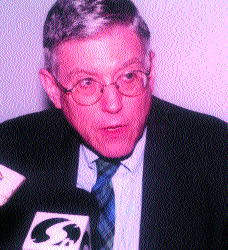


Posted by By PHILIP NWOSU, EMMA EMEOZOR, IME OLA and CHIKA ANUJUE on



AI-Qaeda leader, Osama bin Laden has been making covert plans to topple the government of Nigeria, the United States Ambassador to Nigeria, Mr. John Campbell has said.
AI-Qaeda leader, Osama bin Laden has been making covert plans to topple the government of Nigeria, the United States Ambassador to Nigeria, Mr. John Campbell has said.
Making the revelation in Lagos Tuesday during an interactive session with the press at the United States Consul General, Campbell said it was no secret that the Saudi born al-Qeda leader wants an end to the Obasanjo administration.
The envoy who was responding to a question on the allegation that Nigeria was haven for al-Qaeda vis-à-vis the position of the U.S. government said, "With respect to al-Qaeda, we know perfectly well that Osama bin Laden has publicly called for the overthrow of the government of Nigeria."
Though Campbell did not elaborate Osama bin Laden had in one of his public statements mentioned Nigeria, thus raising fears that the country could be on his organisation's hit list.
Campbell said it was erroneous for anybody to conclude that America's war against terrorism was directed against the Muslim community, pointing out that there were seven million Muslims in the United States and stressing that the religion was not foreign to America.
"Islam is a great religion, the American government sees no difference between Islam and Christianity. Violence is antithetical to Islam." He cited America's involvement in Afghanistan, saying the war has nothing to do with Islam.
Describing the recent meeting between President Olusegun Obasanjo and United President George W. Bush as good for the two country's bilateral relations, Campbell said relations between Nigeria and the U.S. was far deeper than the more complex issue of oil. He expressed optimism that other sectors, beside oil, would dominate US-Nigeria economic relations.
He explained that Washington supported the microeconomic reforms of the Obasanjo administration. "We support the microeconomic reform associated with Obasanjo's economic team because they provide for sustained economic growth." He, however, said his government was concerned about the government's policy on trade ban.
Commending Obasanjo's anti-corruption crusade, Campbell noted that if the effort was sustained, "It will bring about economic growth. Nigeria must compete with the rest of the world for foreign investment. American businessmen looking for foreign investment also look at other countries. They look for economic growth."
He said his government was ever willing to assist Nigeria in clamping on those involved in money laundering, but however, declined to mention names of Nigerians involved and the specific action Washington was taking against them.
"American privacy law preclude me from disclosing who is involved in corrupt practices," he said adding "The U.S. government has not announced those whose visas have been revoked." The envoy pointed out that there were legal procedures through which Nigeria could ask for U.S. legal assistance to prosecute Nigerians involved in money laundering in the U.S.
On Nigeria's request for debt relief, Campbell said America's holding was only three per cent compared to that of major international finance institutions like Paris Club and London Club, pointing out that the issue was under close watch by Washington.
Reacting to Nigeria's quest for a permanent seat at the United Nations Security Council, the envoy said, "My view is that where we must start is how do we strengthen the UN, make it more effective; everything else, it seems to me is subordinate to that question. It is therefore premature to speculate on which nation might seat on a renewed Security Council."
The U.S. ambassador dismissed reports that America had military presence in the Gulf of Guinea. According to him, "Occasionally, three or four American soldiers may be seen in the gulf but they are there for the purpose of training Nigerian soldiers. Commenting on the crisis in the Niger-Delta region, the envoy expressed the hope that it would be resolved according to the principles of good governance, stressing that the situation was of concern to U.S government.
The envoy restated the position of Washington on the fate of exiled former Liberian President Charles Taylor, saying Taylor must be brought to justice for the crimes he committed while in office. While acknowledging that the departure of Taylor from Liberia for Nigeria was a major step towards return of peace and true democracy to the country, he declined to comment on what would be the action of his government if Nigeria failed to turn over Taylor for trial in Sierra Leone. "Discussions are on at a very high level on this, so it will be premature to say what would happen," he said.
Commenting on the political crisis in Togo following the election of Faure Gnassingbe, Campbell said his government supported efforts by African leaders to resolve the crisis. He was however quick to point out that America's "guiding principle is African solution to African problem and to support local efforts. It is not for us to dictate solutions."

